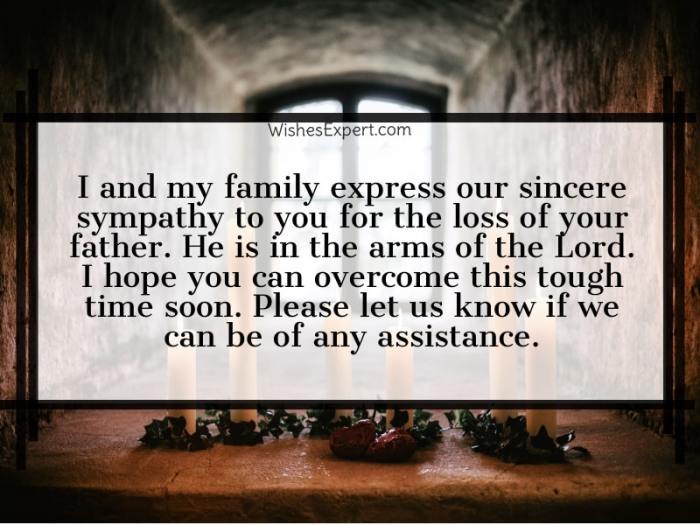In times of grief, words can bring solace and comfort. When a father passes away, offering condolences to the bereaved family is a meaningful gesture that acknowledges the loss and provides support during this difficult time. This guide offers insights into crafting a heartfelt condolence message that expresses sympathy, acknowledges the loss, and provides comfort to those who are grieving.
A condolence message should strike a balance between formality and sincerity. It should convey genuine empathy while respecting the family’s privacy and grief. By using appropriate language and tone, we can create a message that resonates with the bereaved and offers a sense of comfort and support.
Introduction
When someone loses their father, it’s a devastating and painful experience. A father is often a source of strength, guidance, and love in a person’s life. When he passes away, it can leave a void that is difficult to fill.
During this difficult time, it’s important to offer condolences to the bereaved family. A condolence message can express your sympathy and support, and let them know that you’re there for them. It can also help them to feel less alone in their grief.
What to Include in a Condolence Message for a Father’s Death
- Express your sympathy. The most important thing to do in a condolence message is to express your sympathy to the bereaved family. You can do this by saying something like, “I’m so sorry for your loss” or “My heart goes out to you during this difficult time.”
- Share a memory of the deceased. If you have a fond memory of the deceased, share it with the bereaved family. This can help them to remember the good times they had with their loved one.
- Offer your support. Let the bereaved family know that you’re there for them if they need anything. You can do this by saying something like, “I’m here for you if you need anything” or “Please don’t hesitate to reach out if you need someone to talk to.”
- Keep it brief and sincere. A condolence message doesn’t need to be long. Just a few sentences expressing your sympathy and support will be enough.
Tone and Language
In crafting your condolence message, it’s essential to strike the right tone and employ language that conveys respect, empathy, and genuine care. Remember, this message is intended to offer comfort and support during a time of grief and sorrow.
Respect and Empathy
- Be Respectful: Approach the message with utmost respect for the deceased and their family. Avoid any remarks or language that could be perceived as disrespectful or insensitive.
- Show Empathy: Put yourself in the shoes of the bereaved family. Use empathetic language that acknowledges their pain and expresses your genuine concern for their well-being.
- Avoid Clichés: Steer clear of overused clichés or generic phrases that may come across as insincere or impersonal. Instead, opt for heartfelt and personalized words that convey your genuine sentiments.
Expressing Sympathy

Convey your genuine sympathy and condolences with heartfelt words that express your understanding of the profound loss they are experiencing.
Consider sharing personal anecdotes or memories that highlight the positive impact of the deceased on your life. These personal touches can bring comfort and remind the grieving family of the cherished moments they shared with their loved one.
Using Heartfelt Phrases and Sentences
- “My heart aches for you and your family during this difficult time. Your father was a remarkable person, and I will always treasure the memories I have of him.”
- “Please accept my deepest condolences. Your father was a true inspiration to me, and I will always remember his kindness and wisdom.”
- “I know words cannot express the pain you are feeling right now, but I want you to know that I am here for you. Your father was a wonderful man, and I will miss him dearly.”
- “Your father was a pillar of strength and support for so many people. His legacy will live on through the lives he touched.”
- “May the love and support of those around you bring you comfort during this challenging time.”
Sharing Personal Anecdotes or Memories
- Recall a specific instance where the deceased positively impacted your life, highlighting their kindness, wisdom, or humor.
- Share a fond memory of a time you spent together, emphasizing the special bond you had.
- If appropriate, mention a particular trait or characteristic of the deceased that you admired and will always remember.
- These personal anecdotes can help the grieving family see their loved one through your eyes and appreciate the lasting impact they had on others.
Acknowledging the Loss

Acknowledging the loss of a father is a crucial step in offering condolences. Expressing understanding and empathy shows that you recognize the pain and grief the bereaved person is experiencing.
Here are some examples of phrases that demonstrate empathy and support:
Empathetic Phrases:
- “I’m so sorry to hear about the loss of your father. My deepest condolences to you and your family.”
- “Your father was a wonderful person, and I know he will be deeply missed. I’m here for you if you need anything.”
- “I can’t imagine what you’re going through right now. Please know that I’m here to listen whenever you need to talk.”
- “Your father’s memory will live on through the countless lives he touched. He was truly a remarkable person.”
- “I know words can’t express your pain right now, but I want you to know that I’m thinking of you and your family during this difficult time.”
Offering Comfort and Support

During this difficult time, offering comfort and support to the bereaved family is crucial. Simple gestures and heartfelt words can make a significant difference in their grieving process.
Providing Practical Assistance
Offer practical assistance to alleviate some of the burdens they may be facing. This could include:
- Preparing meals or arranging for food delivery.
- Running errands or handling household chores.
- Providing transportation or offering to drive them to appointments.
- Assisting with funeral arrangements or other necessary tasks.
Offering Emotional Support
Be present for the bereaved family and offer emotional support. Sometimes, just listening and allowing them to express their grief can be incredibly comforting.
- Encourage them to talk about their feelings and memories of the deceased.
- Validate their emotions and let them know it’s okay to grieve in their own way.
- Avoid dismissive or judgmental comments.
- Be patient and understanding as they navigate their grief.
Using Thoughtful Words
When expressing your condolences, choose your words carefully. Genuine care and concern can be conveyed through phrases like:
“I am so sorry for your loss. My heart goes out to you and your family during this difficult time.” “Your father was a wonderful person, and I have fond memories of him. He will be deeply missed.” “I know words cannot fully express the pain you are feeling, but please know that I am here for you if you need anything.” “Your father’s legacy will live on through the lives he touched. He was a remarkable man, and I am grateful to have known him.”
Sharing Memories
Sharing fond memories of the deceased father is a beautiful way to honor his life and provide comfort to the bereaved family. These memories can be personal anecdotes, stories about his accomplishments, or simply moments that capture his essence.
When incorporating memories into the condolence message, consider the following:
Emphasizing Positive Traits
- Focus on positive traits and qualities that the father possessed, such as his kindness, sense of humor, or unwavering support.
- Share specific instances that illustrate these traits, making the message more personal and meaningful.
Recalling Special Moments
- Recall special moments shared with the father, such as family vacations, holidays, or everyday interactions.
- Describe these moments in detail, including sensory details and emotions, to create a vivid and lasting impression.
Highlighting Achievements
- Mention the father’s achievements, both personal and professional, that made a positive impact on others.
- Share how these achievements inspired you or others, demonstrating the lasting legacy he has left behind.
Including Personal Anecdotes
- Share personal anecdotes that highlight the father’s unique personality, quirks, or sense of humor.
- These anecdotes can provide a sense of comfort and familiarity, reminding the family of the special bond they shared with him.
Expressing Gratitude
- Express gratitude for the father’s presence in your life, acknowledging the positive impact he had on you or your family.
- This expression of gratitude can help the family feel appreciated and supported during this difficult time.
By sharing fond memories, you can create a lasting tribute to the deceased father and provide solace and comfort to the grieving family.
Closing the Message
The conclusion of a condolence message is crucial in providing a sense of hope and encouragement to the grieving family.
Expressing optimism and emphasizing the enduring legacy of the deceased can bring comfort and support during this difficult time.
Ending on a Positive Note
Closing the message on a positive note leaves the reader with a sense of hope and strength.
It reinforces the idea that even in the face of loss, there is still beauty and goodness to be found in life.
Examples of Encouraging Phrases
- “May the memories of your father’s love and guidance continue to inspire and comfort you.”
- “Your father’s spirit will always be with you, watching over you and guiding you.”
- “Your father’s legacy will live on through the lives he touched and the memories he created.”
- “Though your father is gone, his love remains an eternal flame in your hearts.”
- “May the peace and love of your father’s memory bring you solace and strength.”
Examples and Templates
Condolence messages can vary in tone and style depending on the relationship with the deceased, the circumstances of their death, and the preferences of the bereaved family. Here are a few examples of condolence message templates that can be used as a starting point:
Formal
When writing a formal condolence message, it is important to be respectful and professional. Avoid using slang or colloquialisms, and keep your language simple and clear.
- “Please accept my sincere condolences on the passing of your beloved father. He was a remarkable man who will be deeply missed by all who knew him.”
- “I was saddened to hear about the loss of your father. He was a great man, and I know he will be greatly missed. My thoughts are with you and your family during this difficult time.”
- “Your father was a wonderful man, and I will always cherish the memories I have of him. Please know that I am here for you if you need anything.”
Informal
If you are close to the bereaved family, you may want to write a more informal condolence message. This can be a good opportunity to share your personal memories of the deceased and to offer your support.
- “I’m so sorry to hear about your dad. He was such a great guy, and I’m going to miss him so much. I’ll never forget the time he took us fishing when we were kids. He was so patient with us, even when we kept getting our lines tangled.”
- “Your dad was one of a kind. He always had a smile on his face and a kind word to say. I’m so grateful for the time I got to spend with him. He will be deeply missed.”
- “I know this is a tough time for you and your family. Please know that I’m here for you if you need anything. Just let me know.”
Religious
If the bereaved family is religious, you may want to include a religious sentiment in your condolence message. This can be a comforting gesture for those who are grieving.
- “May God comfort you and your family during this difficult time. Your father was a good man, and he will be greatly missed.”
- “I know that your father is in a better place now. He is with God, and he is at peace.”
- “Your father was a true servant of God. He lived his life according to God’s word, and he will be rewarded for his faithfulness.”
Non-Religious
If the bereaved family is not religious, you may want to avoid using religious language in your condolence message. Instead, you can focus on expressing your sympathy and offering your support.
- “I’m so sorry for your loss. Your father was a wonderful man, and he will be deeply missed.”
- “I know this is a difficult time for you and your family. Please know that I’m here for you if you need anything.”
- “Your father was a great man, and he will always be remembered for his kindness, his generosity, and his love for his family.”
Design and Presentation
In crafting a condolence message for a father’s passing, the design and presentation play a crucial role in conveying empathy and respect.
Strive to create a visually appealing and readable message that resonates with the recipient. Consider the following tips:
Formatting and Design Elements
- Font and Typography: Select a legible and easy-to-read font that complements the tone of your message. Consider using a font size that is comfortable for the eyes, typically between 12 and 14 points.
- Color Scheme: Opt for a neutral and soothing color palette that reflects the somber nature of the occasion. Avoid bright or flashy colors that may be distracting or disrespectful.
- White Space: Incorporate sufficient white space to enhance readability and prevent a cluttered appearance. Proper spacing between lines, paragraphs, and elements creates a clean and organized layout.
- Visual Elements: While visuals can be impactful, use them judiciously. A simple border or subtle background image can add a touch of elegance without overpowering the message.
Visual Appeal and Readability
- Contrast: Ensure adequate contrast between the text and background colors for optimal readability. Poor contrast can strain the eyes and make it difficult to comprehend the message.
- Line Length: Keep line lengths reasonable to avoid overwhelming the reader. Aim for lines that are approximately 60 to 80 characters long, including spaces.
- Paragraph Length: Break your message into digestible paragraphs, each focusing on a specific thought or idea. Short paragraphs are easier to read and absorb.
- Alignment: Maintain consistent alignment throughout the message. Left-aligned text is generally preferred as it is familiar and easy to read. Centered or justified alignment can be used sparingly for emphasis.
By paying attention to design and presentation, you can create a condolence message that is visually appealing, easy to read, and respectful of the grieving family.
Additional Considerations
To ensure a meaningful and appropriate condolence message, consider the following aspects:
Cultural and Religious Customs
Be mindful of the recipient’s cultural and religious background. Different cultures and religions have unique traditions, rituals, and expectations surrounding death and mourning. Consider these customs when crafting your message to avoid any unintentional offense or insensitivity.
- Research the specific customs and traditions associated with the recipient’s culture or religion.
- Use appropriate language and symbols that resonate with the recipient’s beliefs and values.
- Be respectful of any rituals or ceremonies that the family may be observing.
Personal Preferences
Take into account the recipient’s personal preferences and communication style. Some individuals may prefer a formal and traditional message, while others may appreciate a more personal and heartfelt approach. Consider the recipient’s personality, relationship with the deceased, and preferred methods of communication.
- If you are unsure about the recipient’s preferences, err on the side of formality and respect.
- Avoid using overly casual or informal language unless you are certain that the recipient would appreciate it.
- Be mindful of any specific requests or preferences that the family may have communicated.
Summary
Writing a condolence message for a father’s death is a task that requires empathy, sincerity, and respect. By acknowledging the loss, expressing sympathy, and offering comfort, we can provide support to those who are grieving and help them navigate this difficult time.
Whether through written words or spoken gestures, our condolences can make a meaningful difference in the healing process.
Frequently Asked Questions
Question: What are some examples of phrases that convey heartfelt sympathy?
Answer: “My deepest condolences to you and your family during this time of sorrow.” “I am so sorry to hear about the loss of your father. He was a wonderful man, and he will be deeply missed.” “Your father was an extraordinary person, and his memory will live on forever.”
Question: How can I acknowledge the loss in a respectful and empathetic manner?
Answer: “I understand that no words can truly express the pain you are feeling right now, but I want you to know that I am here for you.” “Your father was a pillar of strength and wisdom, and his absence will be deeply felt by all who knew him.”
“I will always cherish the memories I have of your father. He was a kind and generous man who always had a smile on his face.”
Question: What are some ways to offer comfort and support to the bereaved family?
Answer: “Please know that you are not alone during this difficult time. We are here to support you in any way we can.” “If there is anything I can do to help, please don’t hesitate to reach out. I am just a phone call away.”
“Remember that your father’s love will always be with you, even though he is no longer physically present.”